In a concerning development, Iran has confirmed the detention of a teenage French-German cyclist, Lennart Monterlos, who has been missing since mid-June. Iranian Foreign Minister Abbas Araghchi stated that Monterlos was detained for an unspecified infringement while cycling through Iran. This incident raises alarms about the safety of foreign nationals in the country, particularly amidst ongoing tensions and previous cases of French nationals being held in Iran.
| Article Subheadings |
|---|
| 1) Confirmation of Detention |
| 2) French and German Government Reactions |
| 3) Context of Detention: Hostage Diplomacy |
| 4) Accounts from Recent Travelers |
| 5) Broader Implications for Foreign Nationals |
Confirmation of Detention
Iranian officials have confirmed the detention of Lennart Monterlos, a cyclist who disappeared while traveling across Iran. The confirmation was made by Abbas Araghchi, who stated that Monterlos was held for an infraction, although details regarding this offense remain unspecified. The report by the French newspaper Le Monde highlights concerns over Monterlos’ safety during an uncertain time for foreign nationals in the country.
According to reports, Monterlos has not been heard from since around mid-June. His disappearance coincided with escalated military actions in the region, heightening fears for his well-being. Iranian authorities have informed the French Embassy in Tehran about his detention, but details regarding the nature of the alleged infraction or the exact location of Monterlos are still unclear.
French and German Government Reactions
The French government has expressed its concerns regarding the situation of Monterlos and is currently in communication with Iranian authorities. France’s Foreign Ministry has not officially confirmed his detention but is actively engaging with Iranian officials for further information about the cyclist’s condition. They have also reached out to Monterlos’ family and cautioned all French nationals against travel to Iran, citing significant risks.
The German government has also acknowledged the situation concerning Lennart Monterlos. A spokesperson for the German Foreign Ministry mentioned that they are aware of his case but refrained from elaborating further. Consistent warnings against travel to Iran remain in place, especially as the region’s safety and political climates are fraught with tensions that could complicate situations for foreign visitors.
Context of Detention: Hostage Diplomacy
Iran has faced accusations of practicing “hostage diplomacy,” a strategy often employed where foreign nationals are detained with the expectation of leveraging negotiations with their home countries. France has been particularly vocal, asserting that such methods are systematic and deplorable. Currently, two other French nationals, Cécile Kohler and Jacques Paris, have been detained in Iran under conditions reported to be nearly torturous, facing spurious charges.
The French Foreign Ministry has denounced these practices, asserting that all French nationals in Iran are at substantial risk of arbitrary detention purely due to their nationality. They have emphasized that such actions serve as a tool for the Iranian government in geopolitical standoffs, adding layers of complexity and danger to already precarious situations.
Accounts from Recent Travelers
Amidst the tumultuous backdrop of Iran’s political landscape, the experiences of recent travelers have shed light on the conditions and sentiments prevalent in the region. One American cyclist, Ian Andersen, shared his harrowing escape from Iran during heightened hostilities when Israel launched military attacks on Iranian facilities. Having been welcomed into the country prior to the strikes, his experience transformed dramatically amid escalating tensions, prompting immediate concerns for his safety.
On June 15, the day of the attacks, Andersen heard bomb explosions in the distance and received communication from the U.S. State Department outlining options for Americans wishing to leave Iran. Faced with a tense environment and numerous military checkpoints, his journey to the border was fraught with danger and uncertainty, exemplifying the current risks faced by international travelers.
Broader Implications for Foreign Nationals
The situation surrounding Lennart Monterlos serves as a stark reminder of the inherent risks associated with traveling to Iran for foreign nationals. The pattern of arbitrary detentions, particularly of Western citizens, has raised red flags among governments and international organizations alike, leading to stringent advisories against travel. Both the United States and Germany have echoed similar sentiments, urging their citizens to exercise extreme caution or refrain from traveling to Iran altogether.
As these incidents unfold, they pose serious questions regarding the diplomatic relations between Iran and nations such as France and Germany. The potential for diplomatic fallouts grows as more foreign nationals face perilous situations, demanding robust responses from their home countries to ensure the safety of their citizens abroad.
| No. | Key Points |
|---|---|
| 1 | The Iranian government confirmed the detention of cyclist Lennart Monterlos. |
| 2 | Both French and German governments have expressed concern for Monterlos’ welfare. |
| 3 | France accuses Iran of practicing “hostage diplomacy” with detained nationals. |
| 4 | Travelers recount perilous experiences during recent escalations in the region. |
| 5 | Overall implications highlight growing concerns for foreign nationals in Iran. |
Summary
The detention of Lennart Monterlos accentuates the risks faced by foreign nationals traveling in Iran and raises pressing questions about the Iranian government’s treatment of Western citizens. As countries like France and Germany navigate these complexities, the safety of their citizens remains a top priority. This case could have broader diplomatic ramifications, signaling the need for a strategic reassessment regarding interactions with Iran amidst its increasingly tense geopolitical stance.
Frequently Asked Questions
Question: Why was Lennart Monterlos detained in Iran?
Monterlos was detained for allegedly committing an unspecified infraction while cycling through Iran, amidst rising tensions in the region.
Question: How have the French and German governments responded to the detention?
Both governments are in communication with Iranian authorities regarding Monterlos’ welfare, while also advising against travel to Iran for their citizens due to safety concerns.
Question: What do French officials mean by “hostage diplomacy”?
“Hostage diplomacy” refers to the strategy of detaining foreign nationals to leverage negotiations or political agendas, which France accuses Iran of systematically implementing.


